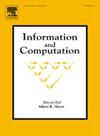随机策略中的不同招数:在有限记忆假设下重温库恩定理
IF 1
4区 计算机科学
Q3 COMPUTER SCIENCE, THEORY & METHODS
引用次数: 0
摘要
在(可能是随机的)图上的双人(对抗)博弈是理论计算机科学中的一个普遍模型,尤其是作为反应式合成的一个框架。当处理固有的概率目标、平衡多个目标或在部分信息的情况下,最佳策略可能需要随机化。定义随机化策略并没有唯一的方法。例如,我们可以使用所谓的混合策略或行为策略。在最一般的情况下,这两类策略的表达能力并不相同。博弈论中的一个开创性结果--库恩定理--断言了它们在完全回忆博弈中的等价性。这个结果的关键依赖于策略使用无限记忆的可能性,即对过去所有观察结果的无限了解。然而,计算机系统实际上是有限的。因此,我们有必要将注意力限制在有限记忆策略上,将其定义为有输出的自动机。随机化可以通过不同的方式实现:初始化、输出或转换可以分别随机化或确定化。在这项研究中,我们研究了双人并发随机博弈,并提供了通过改变上述三个部分中的哪一个随机化而获得的有限记忆策略类的完整分类法。我们的分类法适用于具有完全召回能力的完全信息博弈和不完全信息博弈,也适用于有两个以上参与者的博弈。我们还为不完全召回博弈提供了一种经过调整的分类法。本文章由计算机程序翻译,如有差异,请以英文原文为准。
Different strokes in randomised strategies: Revisiting Kuhn's theorem under finite-memory assumptions
Two-player (antagonistic) games on (possibly stochastic) graphs are a prevalent model in theoretical computer science, notably as a framework for reactive synthesis.
Optimal strategies may require randomisation when dealing with inherently probabilistic goals, balancing multiple objectives, or in contexts of partial information. There is no unique way to define randomised strategies. For instance, one can use so-called mixed strategies or behavioural ones. In the most general setting, these two classes do not share the same expressiveness. A seminal result in game theory — Kuhn's theorem — asserts their equivalence in games of perfect recall.
This result crucially relies on the possibility for strategies to use infinite memory, i.e., unlimited knowledge of all past observations. However, computer systems are finite in practice. Hence it is pertinent to restrict our attention to finite-memory strategies, defined as automata with outputs. Randomisation can be implemented in these in different ways: the initialisation, outputs or transitions can be randomised or deterministic respectively. Depending on which aspects are randomised, the expressiveness of the corresponding class of finite-memory strategies differs.
In this work, we study two-player concurrent stochastic games and provide a complete taxonomy of the classes of finite-memory strategies obtained by varying which of the three aforementioned components are randomised. Our taxonomy holds in games of perfect and imperfect information with perfect recall, and in games with more than two players. We also provide an adapted taxonomy for games with imperfect recall.
求助全文
通过发布文献求助,成功后即可免费获取论文全文。
去求助
来源期刊

Information and Computation
工程技术-计算机:理论方法
CiteScore
2.30
自引率
0.00%
发文量
119
审稿时长
140 days
期刊介绍:
Information and Computation welcomes original papers in all areas of theoretical computer science and computational applications of information theory. Survey articles of exceptional quality will also be considered. Particularly welcome are papers contributing new results in active theoretical areas such as
-Biological computation and computational biology-
Computational complexity-
Computer theorem-proving-
Concurrency and distributed process theory-
Cryptographic theory-
Data base theory-
Decision problems in logic-
Design and analysis of algorithms-
Discrete optimization and mathematical programming-
Inductive inference and learning theory-
Logic & constraint programming-
Program verification & model checking-
Probabilistic & Quantum computation-
Semantics of programming languages-
Symbolic computation, lambda calculus, and rewriting systems-
Types and typechecking
 求助内容:
求助内容: 应助结果提醒方式:
应助结果提醒方式:


